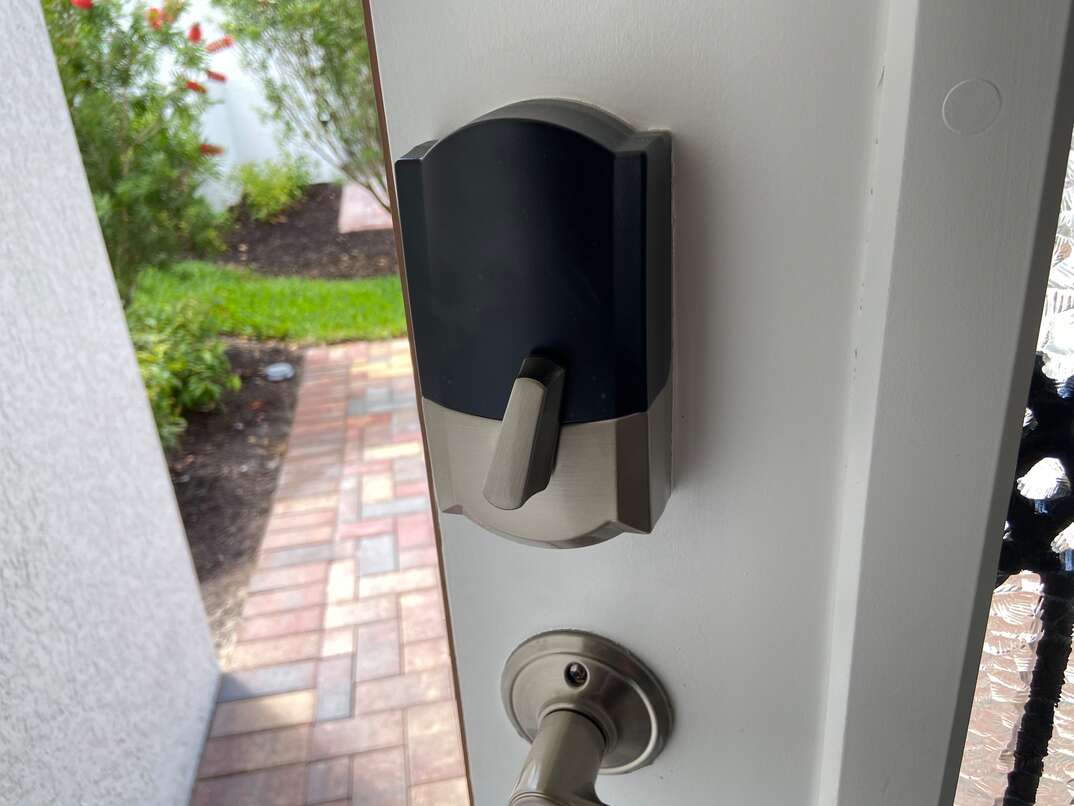Can a Smart Lock Be Hacked?

Smart locks let you unlock your door using a fob, app, passcode or voice command, and some models use biometric data like fingerprints or face scans. These lock systems can be a real lifesaver if you're someone who tends to lose or forget your keys, and they can make your home less vulnerable to intruders.
However, because smart locks are connected to Wi-Fi or Bluetooth, many people worry about the risk of hacking — which would actually make your home less secure. Here’s what you need to know.
Can a Smart Lock Be Hacked?
Any smart home system running on a wireless network has the potential to be hacked, and smart locks are no exception. Smart locks require a Wi-Fi or Bluetooth connection to access the smart functions, leaving them vulnerable to hackers if the connection isn't secure.
There are various ways that someone could hack your smart lock. The most straightforward method is hijacking your password. Password hijacking can occur when you lose your smartphone, or it gets stolen. Anyone with your device could then access your cloud files to discover your passcode or voice recognition recordings.
Another way someone could hack your smart lock is by gaining access to the voice command used to unlock the door. Some hackers can do this remotely using a transducer.
A less likely possibility is that a hacker could use a Bluetooth sniffer to unlock your door. Hacking a smart lock using a Bluetooth sniffer is relatively challenging because it requires complex hardware, expert coding knowledge and close physical proximity to the lock.
Alternatively, someone could hack into your smart hub to unlock a smart lock connected to Wi-Fi. This is also uncommon because it usually requires access to a connected device.
Updating the software on your smart lock can leave it vulnerable if the update contains a bug. These bugs occasionally make it impossible to lock or unlock the door, potentially allowing access to your home. However, regularly updating your lock's software is far more likely to protect you against unauthorized access than increase your risk of being hacked.
What Are Some Ways to Protect Your Smart Lock From Hacking?
One of the most effective ways to protect your smart lock from hackers is updating the software regularly. Choosing a reputable brand with a strong track record for security reduces the likelihood of software bugs affecting your home's security. If you're using a Bluetooth smart lock, check that the manufacturer uses an encrypted authentication system.
Keeping your home's Wi-Fi connection secure is also essential for preventing hacks. Choose a strong password that's hard to guess, and change it regularly to prevent unauthorized access. Purchasing a smart hub from a reputable manufacturer that regularly updates its security systems can also help keep your home secure.
Relying on voice authentication to unlock your door can leave your smart lock more vulnerable to hackers. One of the simplest ways to avoid this issue is not to enable voice command unlocking in the first place. Alternatively, consider choosing a smart lock that uses a voice PIN.
Elocal Editorial Content is for educational and entertainment purposes only. Editorial Content should not be used as a substitute for advice from a licensed professional in your state reviewing your issue. Systems, equipment, issues and circumstances vary. Follow the manufacturer's safety precautions. The opinions, beliefs and viewpoints expressed by the eLocal Editorial Team and other third-party content providers do not necessarily reflect the opinions, beliefs and viewpoints of eLocal or its affiliate companies. Use of the Blog is subject to the
Website Terms and Conditions.The eLocal Editorial Team operates independently of eLocal USA's marketing and sales decisions.



